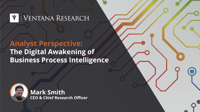The age of digital communication platforms is upon us. The need has never been greater for an open and secure platform that satisfies the demand for enterprise-grade business and technology requirements. Overcoming today’s technology challenges is possible with a next-generation cloud-based delivery model that is both extensible and reliable. Organizations considering a digital communication platform can take decisive steps to ensure digital communications for everyone — inside, outside,...
Read More
Topics:
Customer Experience,
Business Continuity,
Contact Center,
Digital transformation,
Digital Business,
Digital Communications,
Experience Management
To maximize the value of the workforce and the work conducted, organizations need to increase the effectiveness of workers assigned to critical, interrelated tasks. Doing so requires a commitment to planning the best use of workers and resources. Failing to do so can limit an organization’s ability to reach essential milestones and complete work related to business processes with customers, partners and across the supply chain.
Read More
Topics:
Business Continuity,
Operations & Supply Chain,
Digital transformation,
Digital Business,
Work Management
As the pace of digital innovation has accelerated, many organizations have found it harder to manage the portfolio of work conducted by the workforce to ensure timeliness and mitigate the risk of increased costs and resources. The challenges in managing the work related to project plans are not only to ensure the timeliness in performing and tracking the individual tasks and activities every single moment of the day, but also having the intelligence to adjust and guide all future work. The...
Read More
Topics:
Business Continuity,
Operations & Supply Chain,
Digital transformation,
Digital Business,
Work Management
The work environment today demands that your organization advances the efficiency to execute business processes for continuous operations to have a positive impact on business performance. The capability to be responsive to any range of minor to disruptive business events is required to support business continuity and level of organizational readiness to meet the needs of digital business. Ventana Research asserts that in 2025, one-quarter of organizations will remain digitally ineffective in...
Read More
Topics:
Customer Experience,
Voice of the Customer,
embedded analytics,
Analytics,
Business Intelligence,
Cloud Computing,
Contact Center,
Data,
Digital Technology,
Operations & Supply Chain,
Enterprise Resource Planning,
Digital transformation,
natural language processing,
continuous supply chain,
agent management,
Digital Business,
Experience Management,
Customer Experience Management,
Field Service,
Process Mining,
Streaming Analytics,
AI & Machine Learning
Strategic planning has always been difficult. But it is even more so in this age of rapid digital transformation and the pressure of business continuity, which has introduced disruptive changes. What’s needed, ironically, is a methodical approach to how an organization manages strategic planning to allow for beneficial disruption that is not avoidable, balancing finance and operations, engaging existing expertise and factoring in technology to ensure that new initiatives can be strategically...
Read More
Topics:
Performance Management,
Business Continuity,
Digital transformation,
Digital Business,
Digital Security,
Digital Communications,
Experience Management














